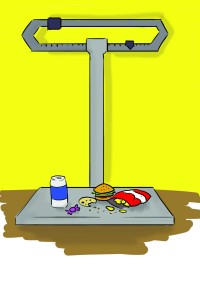Naturally thin? It’s all in your genes


It’s natural to be astonished when we see a slim person chomping down on a very high-calorie meal without worrying about how it taking a toll on their weight.
It’s even more natural to want be that person who has no guilt in over-indulging in chocolate while the rest of us spend hours at the gym on a weekly basis to keep ourselves looking the equivalent.
Many argue that it’s our diet, environment or genetics that are responsible for the way our bodies look. All that holds a comparative truth. It can be a combination of all three intertwining factors, each holding more weight than the other.
With that said, we each have an excuse as to why our bodies look the way they do without really understanding the complexities behind it.
Obesity rates in North America and the UK have been soaring. Obesity is beginning to change our genetics and incorporate itself into our DNA.
Research investigating overweight people has provided little breakthrough. In order to discover new information, new methods were needed: studying thin people.
Often frowned upon, fat tissue is composed of fat cells that consist of an oil droplet that the body burns in a chemical reaction when energy is scarce.
According to Eric Ravussin, an obesity geneticist, our ancestors went through periods of feast or famine, gaining weight during the feast in order to survive the famine. Ironically, it turned into the survival of the fattest.
This supposedly evolutionary trait passed onto people today, explaining why some of us are able to deposit fat more easily.
However, this proves false for some of the participants in the UK study. The experiment, monitored by Carel Le Raux of Imperial College of London, kept track of each of the volunteers’ body fat percentage and physical appearance week after week.
Many of the participants citied that if they ate past the feeling of fullness, they’d often throw up. Consequently, many of them were not able to meet their daily calorie intake needs, despite wanting to
However, one volunteer defied these statistics. Martin Wong, a male of Asian descent, looked no physically different and gained 3.5 per cent of his weight — only a fraction of what his counterparts gained.
What made this finding notable wasn’t that Wong gained the least amount of weight, but how his body handled the different changes.
The excessive calorie intake resulted in an increase in fat tissue, but for Wong, it resulted in an increase in muscle tissue. For those like Wong, it may be genetically impossible to become overweight.
Genetically speaking, our body’s ability to cope with such drastic changes go hand-in-hand with the conception that humans cannot consciously determine their weight because it is biologically fixed.
For most of our adult life, our weight will be relatively stable over a long period of time.
Gabriel Moreno-Hagelsieb, a biology professor at Wilfrid Laurier University, mentions a factor that many of us fail to consider: microbes.
Our intestines are covered with microbes that play a role in the absorption of our food and the conversion of energy.
According to Moreno-Hagelsieb, “Microbes are different in people with obesity problems than people without obesity problems—the food is what stimulates the microbes.
Microbes become more efficient at extracting energy and making the food better digested, it results in the person absorbing more of the food.”
“By eating fatty foods at a younger age, they [microbes] will adapt to digesting the foods we eat faster,” said Moreno-Hagelsieb.
Another aspect of weight management that is often overlooked is our genetic predisposition to certain enzymes in our diets.
“Eat more of a balanced diet. You have to enjoy life anyway, just have control over how much you eat,” said Moreno-Hagelsieb.
“Don’t crash diet. If you eat too little, your body adapts to that and reacts by making the microbes become more efficient. But it will backfire since your body will think that there’s no food and it will begin to store fat much more easily something you don’t want.”
The thought of being thin forever is an illusion.
There are many theories explaining why some stay skinnier than others, but it is atypical to stay skinny forever.
Exerting self-discipline and strength of will does provide us consolation regarding the fact that we can be in-charge of our bodies, but above and beyond all, it is our health that should be our first priority.
However, it is our health which is reflected through our bodies and a manifestation of how we view and feel about ourselves.
It is our genetics that make us, but our lifestyle that moulds us.


